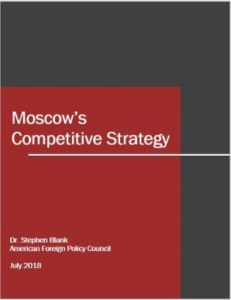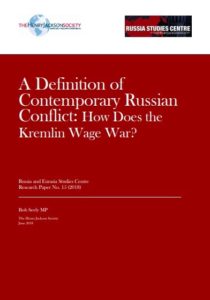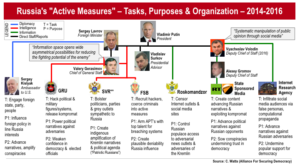 Since at least 2005, Russia’s leadership has believed itself to be at war with the West. This war is not primarily one of kinetic combat though recent moves suggest that Moscow believes such a war is increasingly conceivable. Rather it should be described as a new form of political warfare that derives in many from Soviet precedents, according to Moscow’s Competitive Strategy, a new report from the Lexington Institute.
Since at least 2005, Russia’s leadership has believed itself to be at war with the West. This war is not primarily one of kinetic combat though recent moves suggest that Moscow believes such a war is increasingly conceivable. Rather it should be described as a new form of political warfare that derives in many from Soviet precedents, according to Moscow’s Competitive Strategy, a new report from the Lexington Institute.
Political warfare is a whole of government strategy where military forces play a vital but not necessarily primary role in the strategic rivalry with Washington. Their purpose is first to intimidate and then to deter the West, acquire a usable military superiority over neighbors and on Russia’s frontiers, and sustain the regime and its view of Russia as a great power that is under perpetual siege from abroad, notes author Stephen Blank, Ph.D.:
 Russia’s cyber and information warfare operations against the U.S. during the 2016 elections were carried out in ways that virtually announced that it was Russia that was attacking U.S. networks and defying Washington to retaliate against it. Putin and his subordinates have long since convinced themselves of the existence of threats from policies or systems that do not exist. There has been no systematic policy of democracy promotion for years from the West notwithstanding Russian complaints or the laments of those Western groups who support such programs.
Russia’s cyber and information warfare operations against the U.S. during the 2016 elections were carried out in ways that virtually announced that it was Russia that was attacking U.S. networks and defying Washington to retaliate against it. Putin and his subordinates have long since convinced themselves of the existence of threats from policies or systems that do not exist. There has been no systematic policy of democracy promotion for years from the West notwithstanding Russian complaints or the laments of those Western groups who support such programs.
“Europe is under attack whether it accepts it or not,” Blank contends. “And Putin’s Russia is an implacable foe, i.e. one that cannot be placated, for it will regard dialogue as surrender and proof of its allegations concerning the West’s lack of moral fiber.”
“Cross-domain coercion”

Clint Watts/Alliance for Securing Democracy
“The resort to non-kinetic and information warfare reflects Russia’s understanding that coordinated cyber and informational strikes, along with the synchronized use of all the other elements of DIME [the full range of the instruments of power: diplomacy, information, military power and economics] is what embodies contemporary warfare and that on this ground it can compete equally with the West,” Blank adds. “The Russian definition of the terms cyber warfare (kibervoina) or information war, (informatsionnaya voina) or information confrontation (informatsioonoe protivoborstvo) is holistic.”
 We are confronted by a Russian adversary not only in possession of new weapons but also with new tactics and innovative thinking about contemporary warfare. Therefore we must also disenthrall ourselves and think anew about that subject, the report concludes:
We are confronted by a Russian adversary not only in possession of new weapons but also with new tactics and innovative thinking about contemporary warfare. Therefore we must also disenthrall ourselves and think anew about that subject, the report concludes:
This requires more than new, advanced weapons as promised by the third offset strategy. And in any case Congressional unwillingness to spend what is needed to mount an effective defense of Europe inhibits that program and leaves without a really strategic approach to make up for the shortfall in expected or promised capabilities. That reluctance also manifests itself in Europe where too many still think that Europe is at peace and that if we could only get back to dialogues with Moscow we could refrain form the onerous challenges of self-defense.







